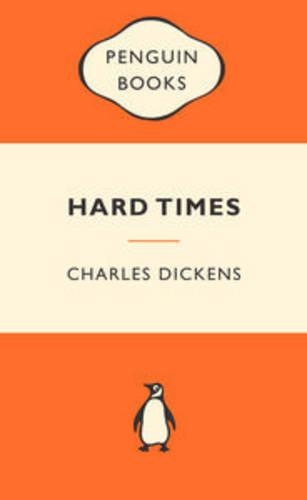
Hard Times: Popular Penguins
(Paperback)
Available Formats
Hardback
Published: 15th May 1992
Paperback
Published: 1st March 2012
Paperback
Published: 19th September 2012
Paperback, New edition
Published: 5th January 1995
Paperback
Published: 1st April 2009
Hardback
Published: 9th December 2011
Hardback, New edition
Published: 15th February 2020
Hardback
Published: 13th September 2016
Paperback
Published: 5th May 2003
Paperback
Published: 1st July 2008
Paperback
Published: 12th June 2024
Paperback
Published: 15th August 2015
Paperback
Published: 28th June 2010
Publishing Details
Hard Times: Popular Penguins
By (Author) Charles Dickens
Penguin Books Ltd
Penguin Books Ltd
28th June 2010
United Kingdom
Classifications
Physical Properties
Paperback
364
Width 112mm, Height 180mm, Spine 24mm
206g
Description
Coketown is dominated by the figure of Mr Thomas Gradgrind, school headmaster and model of Utilitarian success. Feeding both his pupils and his family with facts, he bans fancy and wonder from young adult minds. As a consequence his obedient daughter Louisa marries the loveless businessman and 'bully of humanity' Mr Bounderby, and his son Tom rebels to become embroiled in gambling and robbery. Filled with the details and wonders of small-town life, Hard Times is a daring novel of ideas - and ultimately, a celebration of love, hope, and the limitless possibilities of the imagination.
Author Bio
Charles Dickens was born in Portsmouth on 7 February 1812, the second of eight children. Dickens's childhood experiences were similar to those depicted in David Copperfield. His father, who was a government clerk, was imprisoned for debt and Dickens was briefly sent to work in a blacking warehouse at the age of twelve. He received little formal education, but taught himself shorthand and became a reporter of parliamentary debates for the Morning Chronicle. He began to publish sketches in various periodicals, which were subsequently republished as Sketches by Boz. The Pickwick Papers was published in 1836-7, after a slow start it became a publishing phenomenon and Dickens's characters the centre of a popular cult. Part of the secret of his success was the method of cheap serial publication he adopted; thereafter, all Dickens's novels were first published in serial form. He began Oliver Twist in 1837, followed by Nicholas Nickleby (1838) and The Old Curiosity Shop (1840-41). After finishing Barnaby Rudge (1841) Dickens set off for America; he went full of enthusiasm for the young republic but, in spite of a triumphant reception, he returned disillusioned. His experiences are recorded in American Notes (1842). A Christmas Carol, the first of the hugely popular Christmas Books, appeared in 1843, while Martin Chuzzlewit, which included a fictionalized account of his American travels, was first published over the period 1843-4. During 1844-6 Dickens travelled abroad and he began Dombey and Son while in Switzerland. This and David Copperfield (1849-50) were more serious in theme and more carefully planned than his early novels. In later works, such as Bleak House (1853) and Little Dorrit (1857), Dickens's social criticism became more radical and his comedy more savage. In 1850 Dickens started the weekly periodical Household Words, succeeded in 1859 by All the Year Round. Dickens's health was failing during the 1860s and the physical strain of the public readings which he began in 1858 hastened his decline, although Our Mutual Friend (1865) retained some of his best comedy. His last novel, The Mystery of Edwin Drood, was never completed and he died on 9 June 1870. Public grief at his death was considerable and he was buried in the Poets' Corner of Westminster Abbey.
